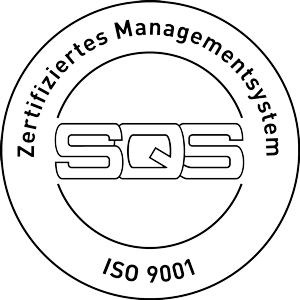Sustained quality management
Balgrist University Hospital makes every effort to sustain a quality management system with an effective quality policy that plans, steers, and improves.
Our quality principles
- Balgrist University Hospital provides the best-possible investigation, diagnosis, and treatment for each patient with problems affecting the musculoskeletal system.
- The patient and the treating physician are the main concerns of all efforts to maintain and improve the quality of care.
- Every member of staff is tasked with promoting quality.
- Balgrist University Hospital educates and encourages members of staff to achieve a constant improvement in quality.
- The integration of clinical research is a key component of improving quality in medicine. Clinical research consistently reviews and improves the standards of treatment.
Contact

Johannes Wallat
Quality Manager
SQS-certified
Balgrist University Hospital was successfully recertified to the ISO 9001:2015 standard without any restrictions in 2023. The audit was carried out by the Swiss Association for Quality Management (SQS). The auditors praised Balgrist University Hospital's continuous quality work.
Quality of indications
The quality of the diagnosis and indication has a decisive influence on the patient’s quality of treatment and quality of life. Balgrist University Hospital is committed to maintaining the highest standards in indication quality. The goal is to ensure the best-possible investigation, diagnosis, and treatment for each patient according to their needs.
Internal peer review
Diagnoses and indications for treatment are discussed daily at the interdisciplinary morning meetings. These medical meetings are an important quality assurance tool for deciding on the diagnosis and optimal treatment of complex conditions through an analytical review by our experts in different fields.
Quality management system
The entire Balgrist University Hospital has held ISO 9001 certification since September 2008. This successful accreditation is the result of the hospital’s continuous efforts to improve the quality of our services. We are very proud that we are the first Swiss university hospital to hold full ISO 9001:2015 certification, which we have done since 2017.
Successful ISO certification is a major component in the constant improvement of the services we provide our patients. Knowledge accumulated in establishing our quality management system confirms that we have mastered the business processes at Balgrist University Hospital and can offer our clients comprehensive first-class medical quality.
Balgrist University Hospital compiles, steers and develops its procedures according to the process-oriented ISO model. The Plan-Do-Check-Act (PDCA) cycle is a key component of our improvement process.
Patient safety
Hospital hygiene
Hospital hygiene comprises all measures involved in preventing and monitoring infections acquired in hospital (nosocomial infections). It includes preventing the transmission and/or spread of multiresistant pathogens in the hospital.
At Balgrist University Hospital, we have an expert in hospital hygiene and infection control, who draws up hygiene guidelines according to the latest evidence-based medicine. He is available to assist with all questions on hospital hygiene.
Regularly educating and training hospital staff is a key aspect of efficient hygiene management. The hospital hygiene department coordinates this training.
Isolation measures in the case of relevant nosocomial pathogens are monitored and coordinated by the hospital hygiene department. In addition, they check on hand hygiene within the hospital. The department is also responsible for coordinating the procedure for any epidemiological investigations.
Critical incident reporting system
Balgrist University Hospital has introduced a Critical Incident Reporting System (CIRS), with patient safety as the main concern. A critical incident is any undesirable event or result that could negatively impact the patient. This reporting system should help to prevent errors that could otherwise happen again.
Goals and procedure
Members of staff report all critical incidents occurring at the Balgrist University Hospital in Zurich. The incident is then systematically recorded following a uniform procedure. The latest critical incident reports are reviewed and processed by an interprofessional body each month. The CIRS helps Balgrist University Hospital to learn from past mistakes and improve patient safety by implementing the appropriate measures.
Assessments
ANQ is the Swiss National Association for Quality Development in Hospitals and Clinics. Every year, they review various aspects of quality and publish the results. The individual hospitals are measured on the strengths of their efforts to ensure and improve quality and are compared with other hospitals. Balgrist University Hospital participates in ANQ assessments.
Balgrist University Hospital takes part in the following ANQ assessments:
- Patient satisfaction
- Readmission to hospital
- Revision surgery
- Recorded falls
- Decubitus ulcers (pressure sores)
In-house measurements:
- Surveys of referring doctors
- Surveys of hospital staff
- Patient satisfaction
- Minimal data set
- SIRIS (transplant registry)
- Swissnoso (infection control)
Internal vessels for quality assurance
Quality steering committee
The highest organ for quality assurance is the Quality Steering Committee (QSC). The committee consists of the Hospital Director, the member of the leadership team responsible for quality, and the Quality Manager. The QSC steers the quality management system and sets the quality goals each year.
Q-info
Members of staff are regularly informed about important topics in quality management, forthcoming dates, and relevant information. These information sessions (Q-Info) take place three or four times a year.
External bodies
VZK
Balgrist University Hospital quality management is represented in the Zurich hospitals association, the Verband Zürcher Krankenhäuser (VZK).
The VZK coordinates some of the quality activities of its members and brings the association’s interests to cantonal and national bodies. The aim is to bring together stakeholders and topics to promote the exchange of experience and opinions.
The quality committee meets four times a year. It is concerned with future development, supports ongoing activities, and prepares proposals for the attention of the executive board.
H+
H+ is the national association of state and private hospitals, clinics, and healthcare facilities. Active members include 226 hospitals, clinics, and healthcare facilities on 380 sites, with about 160 associations, authorities, institutes, companies and individuals as partner members.
Each year, the hospitals and clinics have the opportunity to issue a quality report following the format of H+ Hospitals of Switzerland and to publish the report on the hospital portal: spitalinformation.ch. The quality report is intended for healthcare professionals and interested members of the public.
Balgrist University Hospital produces an annual quality report.




